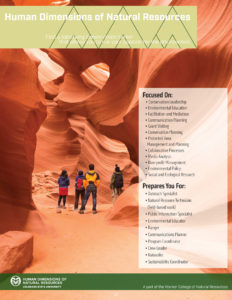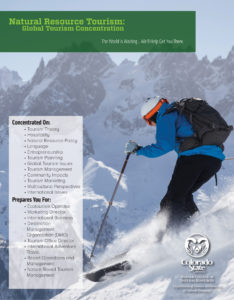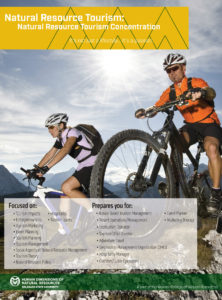Natural Resource Tourism (2 concentrations)
Global Tourism
Natural Resource Tourism
Human Dimensions of Natural Resources

Natural Resource Tourism

Global Tourism
Global tourism prepares students for careers with private, for-profit enterprises that provide services to tourists.
Additionally, opportunities can be found with some non-profit and governmental organizations in various countries. Specific jobs might include ecotourism operator, conference and event planner, marketing director, tourism information center director, park concession manager, and convention and visitor bureau director.
The curriculum is focused on a unique blend of subjects. Business and tourism topics provide students with planning, management, and entrepreneurship skills essential in the tourism industry. Because sustainable tourism requires a healthy natural environment, the environment is another area of study. Finally, students are provided cross-cultural experience by learning a second language, studying at a university abroad, and participating in an international internship.
[ Curriculum Checklist and Elective List]
Natural Resource Tourism

Natural Resource tourism prepares students for careers in natural resource related tourism positions in the private, public, and non-profit sectors.Opportunities are available in resorts, tour companies, outfitting and guiding companies, major corporations, ecotourism companies, cruise lines, etc. Public sector opportunities are available with state travel and tourism offices, as well as national and international tourism offices. Non-profits such as travel and tourism bureaus, hotel and lodging associations, meeting planner groups, and ski/tour associations value natural resource tourism graduates.
The curriculum emphasizes courses in tourism management, marketing and planning, natural resources, business, and social science to develop appropriate skills for work in recreation and tourism enterprises.
Independent Study and Study Abroad are also options.

